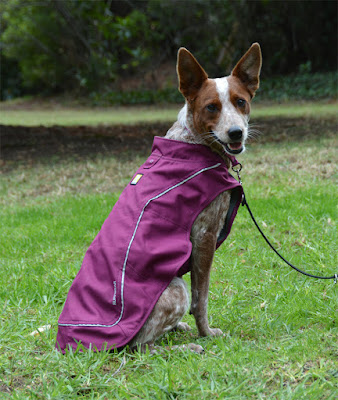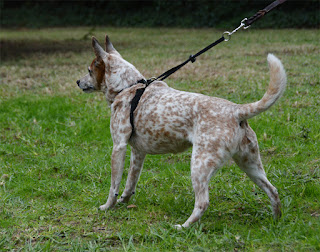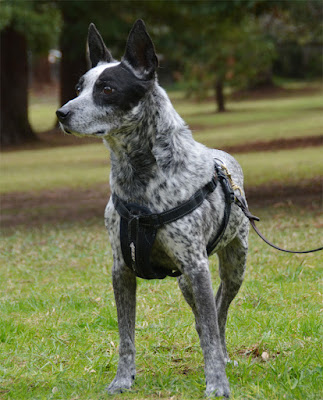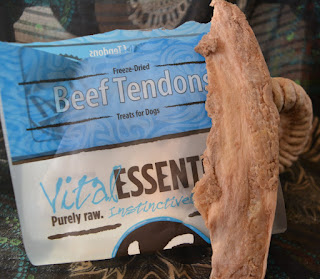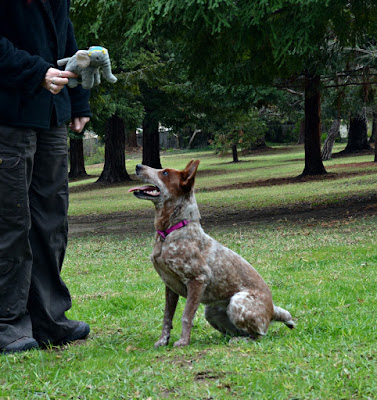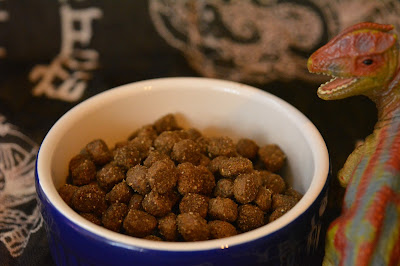Fish oil comes in capsules and bottled, marketed for humans and just for dogs, but what gives you the most bang for your buck? There's some
compelling evidence for fish oil being actually useful for dogs, but not all dietary supplements are created equal. Two years ago
this New York Times article, about supplements not containing what's on the label, made me reconsider the few dietary supplements I do use. Happily, someone has actually gone to the trouble of
analyzing various fish oil products, at least for humans.
So What's the Cheapest Source of Fish Oil?
 |
| Briz likes fish. And food. Any food, really. |
Ask a group of dog people what is the most economical fish oil for their dogs, and you will get a difference answer from every person.
"Liquid products are more expensive."
"Capsules are way more expensive."
"Some more costly products are more economical because they are more potent and therefore can be given in much smaller doses."
Which of these is actually true? Are capsules or liquid cheaper? Is fish oil marketed for dogs more expensive than fish oil marketed for people? Are tested products more expensive than untested ones?
Let's Do Some Math
I quickly learned that nobody had a satisfactory answer to my question, and I really love concrete answers. As the cost of fish oil is measurable, all that was required was some figuring...and maybe a spreadsheet. For comparison purposes, I picked two dog products that were recommended to me, and two human products that rated well on the list of tested fish oils.
- Grizzly Pollock Oil by Grizzly Pet Products seems to be one of the most economical products available at www.Chewy.com, at $23 for a 32-oz bottle. That's about $0.71 per fluid ounce.
- Vetoquinol AllerG-3 seems more expensive, at $15 for an 8-oz bottle. That's about $1.90 per fluid ounce.
- The Vitamin Shoppe's house brand Omega-3 1100mg Fish Oil was the second-highest rated human product, containing slightly more of the active ingredients than was listed on the label. LabDoor rated it the best value for human products, at $35 for 180 capsules. That's $0.19 per pill.
- Controlled Labs OxiMega Fish Oil was another readily-available product with active ingredient levels that exceeded those listed on the label. At $22 for 120 capsules, it also seems to be a good value. That's $0.18 per pill.
So at 18-cents per pill, the Controlled Labs capsules initially seemed like the best value, and capsules in general appeared to be the most economical form in which to buy fish oil. Next, I checked the manufacturer's recommended dosage for each product, and calculated how much it would cost to feed to 45-lb Brisbane. Here's what I learned:
- At $0.08 per 3.5ml pump, it would cost $0.16 per day to feed Brisbane the recommended dose of 2 pumps per day of Grizzly Pollack Oil. That's $4.80 a month.
- At $0.06 per 1-ml pump, it would cost $0.12 per day to feed Brisbane the recommended dose of 2 pumps per day of Vetoquinol AllerGo3 liquid. That's $3.60 a month.
- At $0.19 per 1200mg capsule, it would cost $0.19 per day to feed Brisbane the recommended (for humans) dose of 1 capsule per day of of Vitamin Shoppe Omega-3 fish oil. That's $5.70 a month.
- At $0.18 per capsule, it would cost $0.36 per day to feed Brisbane the recommended (for humans) dose of 2 capsules per day of Controlled Labs OxiMega fish oil. That's $10.80 a month.
Wow, so the OxiMega fish oil is actually the most expensive when given at the manufacturer's recommended dose! The Vetoquinol was the most expensive per ounce, but the least per recommended dose. Both of the liquid products turned out to be a better value than the capsules...right? Not exactly.
It's All About the Active Ingredients
As it turns out, aside from the omega-3 fatty acids, the active ingredients in fish oil are really Docosahexaenoic acid (DHA) and Eicosapentaenoic acid (EPA). According to the
University of Colorado Veterinary Hospital, the maximum recommended dose of EPA+DHA for
osteoarthritis is 310mg per kg of body weight per day. At 45-lbs or 20.5kg, Brisbane would get about 3000mg per day. That's a lot, and the amount of EPA and DHA varies immensely between products. Here's how it changes the value:
- 1 3.5-ml pump of Grizzly Pollack Oil contains 195mg of DHA and 385mg of EPA for a total of 580mg per pump. The maximum dose of 3000mg for Brisbane would be 5 pumps at a cost of $0.40 per day, and $12 per month.
- 1 1-ml pump of Vetoquinol AllerG-3 contains 120mg of DHA and 180mg of EPA for a total of 300mg. The maximum dose of 3000mg for Brisbane would be 10 pumps at a a cost of $0.60 per day, and $18 per month.
- 1 1200mg capsule of Vitamin Shoppe Omega-3 fish oil contains 240mg DHA and 600mg of EPA for a total of 840mg per pill. The maximum dose of 3000mg for Brisbane would be 4 pills a a cost of $0.76 per day, and $22.80 per month.
- 1 capsule of Controlled Labs OxiMega fish oil contains 200mg DHA and 400mg of EPA, for a total of 600mg. The maximum dose of 3000mg for Brisbane would be 5 pills at a cost of $0.90 per day, and $27 per month.
So What's the Best Source of Fish Oil?
Of the four products I examined here, the Grizzly Pollack Oil is the most economical. Chewy.com also has it available in a 64-oz bottle that would drop the price per month for Brisbane to $10.50, which means I should probably order that right now and not have to worry about it for a few months. I could also rotate that with Grizzly Salmon Oil, which would cost $10.80 per month to feed if I bought the giant bottle. The salmon oil is slightly more expensive than the pollock oil, but also contains slightly more EPA and DHA so it evens out. Liquid products do indeed seem to be less expensive than capsules, but I don't think any have been tested by a third party so I have to take the manufacturer's word that they contain the levels of active ingredients claimed. It's a trade-off.
This was fun! I learned a lot, and the results weren't quite what I expected. Please feel free to check my math, question my motives, or request the same breakdown for another product!






